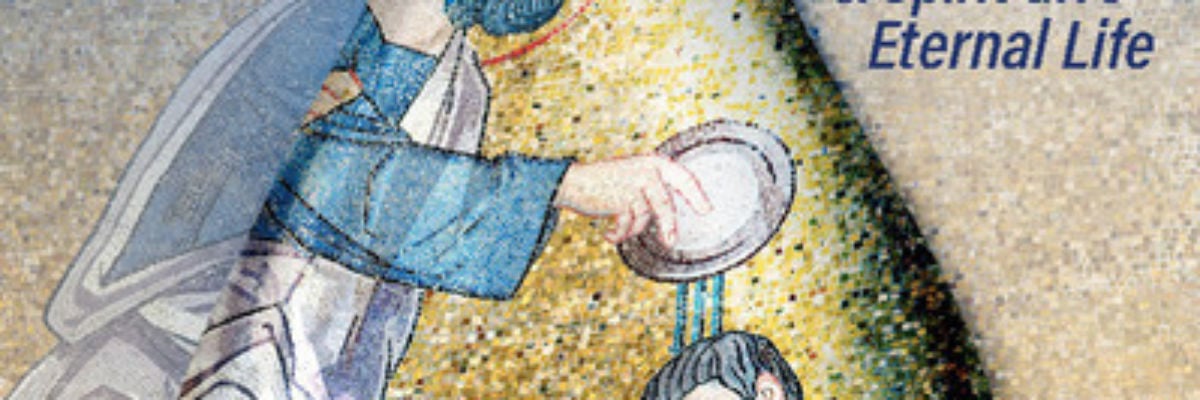
Catholic apologist Karlo Broussard joins Cy Kellett to dive into the significance of baptism in the Catholic faith. In this engaging discussion, Karlo highlights how baptism is not just a ritual but a vital means through which Christ communicates saving grace, drawing on Scripture to clarify its importance in the life of believers.
Transcript:
Cy: What’s the biblical evidence for baptism actually saving us?
Karlo: Yeah, that’s a good question. But before I answer that question, may I make another distinction?
Cy: Oh, but you deny that you speak more precisely than I do, and then you want to make clear. Yes, please make a clear distinction.
Karlo: Yeah, so notice how you just said that. You know, some Protestants will say baptism is merely a symbol, but we actually have to nuance that even more and ask the question, a symbol of what? Because there are some Baptists, say one in particular, Protestant apologist Gavin Ortland, who will affirm that baptism is merely a symbol of the grace of salvation, but actually gives us grace after we’re already saved, you see, as opposed to another Baptist who will say, well, baptism is just a symbol of grace, whatever kind of grace we’re talking about.
And so it’s important to make that distinction. For this reason, what we’re after here is evidence that baptism is not merely a symbol of the grace of salvation, but actually communicates the grace of salvation to us.
And then, as I do in my book, Cy, I have a whole chapter on this in John, chapter 3, verses 3 through 5, Jesus’ famous born again discourse where he says, unless a man is born again of water and spirit, he cannot enter the kingdom of heaven. Nicodemus responds and says, how can a man be born again? Must he enter his mother’s womb a second time?
So notice he’s thinking on a literalistic, natural, physical level. And of course, Jesus responds by saying, unless a man is born again of water and spirit, he cannot enter the kingdom of heaven.
And of course, that phrase “water and spirit” is the subject of debate because that will determine what Jesus means. And what is this second birth? So as I argue in my book, water and spirit refers to baptism, and the way in which I do this in some size that Jesus tells Nicodemus, are you a teacher of the law and you don’t know this?
The implication being that given that he’s a teacher of Israel and knowing the Israel scriptures and the Old Testament prophets, he should know what Jesus is talking about when he’s talking about new birth, water and spirit.
So that raises the question, well, what is Jesus alluding to that Nicodemus should know about? As I argue in my book, I think it’s the prophet Ezekiel in chapter 36, where he talks about how in the Messianic age, God will bring about within his people a new heart.
So notice there’s a renewal of his people, and he will sprinkle clean water upon them, and he will give them his Spirit. So in the Prophet Ezekiel, chapter 36, you have water, spirit, God’s Spirit, and interior renewal.
Well, as I point out in my book, it was part of Jewish belief that that prophecy would be fulfilled in a baptismal ministry at the time of the Messiah. And so here comes Jesus talking about interior renewal via the new birth, water, and the Spirit of God.
And so what does that refer to? It refers to the baptismal ministry in the Messianic age. It refers to baptism. And of course, you have baptismal imagery both before and after this teaching of our Lord within the immediate context, thereby giving us even further reason to conclude that the new birth that Jesus speaks of there in John 3:5 is indeed baptism.
And if baptism is a necessary condition for us to enter the kingdom of heaven, that is to say, to have eternal life.
And then just real briefly, 1 Peter 3:21, St. Peter says, baptism now saves you. And in that text, he juxtaposes the exterior washing. He says it is not merely a cleansing of the body, but the appeal to God for a clear conscience.
So he juxtaposes the exterior washing with what is going on interiorly. Well, what’s going on interiorly? It’s the same thing that’s happening exteriorly, just spiritually, namely a washing.
And so when he says, baptism now saves you, what he means by salvation is an interior spiritual washing that is indeed symbolized by the exterior washing of the body with water. And he draws a parallel with that ritual washing and the waters of Noah, and how through the flood waters, Noah and his family were saved.
And that’s the backdrop against which Peter says, baptism now saves you. And so we have Jesus, we have Peter. And then, of course, Paul in Romans 6:3-4, and then all the way through verse 18. I go into great detail in my book, Cy, but here’s what Paul says: that whenever we are baptized, we are baptized into the death of Christ, and that we rise with him to a newness of life.
Then in verse 7, Paul says, in that baptismal death, we are freed from sin, as the English translations have it. But the Greek word therefore freed, the verb is to justify, literally, we are justified from sin.
And how does Paul envision that justification? In verses 17 through 18, he describes how in this baptismal death and through the resurrection with Christ in baptism, we are freed from the power of sin. That, my friend, is interior renewal, freedom interiorly from the slavery of sin. That’s interior renewal. That’s the new birth.
And so we have our Lord revealing to us the new birth being baptism. And then Peter and Paul unpack that new birth to explain to us what that is: interior cleansing salvation via Peter, 1 Peter 3:21; interior freedom from the slavery of sin via Paul, Romans 6:3-18.
Cy: Wow, Karlo, I gotta say. So you have, it’s extraordinary in scripture. You have all. You go all the way to the very ancient. I mean, I imagine you could probably find other if we gave you enough time.
But you go to the prophecy Ezekiel prophesying that what God is going to do. Very, very precise prophecy of what God is going to do. Jesus telling Nicodemus, look, you’re a teacher of Israel. Did you not know this was going to happen?
Be plain like there is an actual prophecy of this. And then even after Jesus, the apostles telling us how this Ezekiel prophecy has been fulfilled in the baptism established by Jesus. That’s a lot of biblical evidence for the sacrament.
Karlo: Yeah, and that’s just three passages, brother. There’s a whole lot more that I deal with in my book *Baptism Now Saves*, which you can get at shop.catholic.com.
Cy: Right. I mean, you could even the association of baptism with circumcision, the association of baptism with the passing through the waters of the Red Sea. There’s a whole, like you almost get the sense that there’s a lot of preparation for the reception of this sacrament, that there’s a thousand years of preparation for the reception of the sacrament in the person of Jesus.
Karlo: Yeah. And you know, and this, it provides an answer to that initial question you asked. You know, what’s… Where does the Bible talk about God communicating grace through outward signs?
Well, in this case, we have the outward sign of the washing of water, which communicates to us a variety of interior things. The Holy Spirit himself is given to us through this washing, as Peter said, the interior cleansing or salvation, which he explicitly mentions, and the interior freedom from the slavery to sin.
This is our Red Sea, you know, to rip off of Paul there. In light of the Old Testament, as the Israelites were set free from the slavery in Egypt through the waters of the Red Sea, St. Paul says we are set free from the slavery of sin through the waters of ritual baptism.
Cy: So not just a symbol, an actual setting free, this is an actual…
Karlo: Yeah. Okay. Now, of course, there’s limits on time that we can spend.
Karlo: We’re going to have some other segments.



